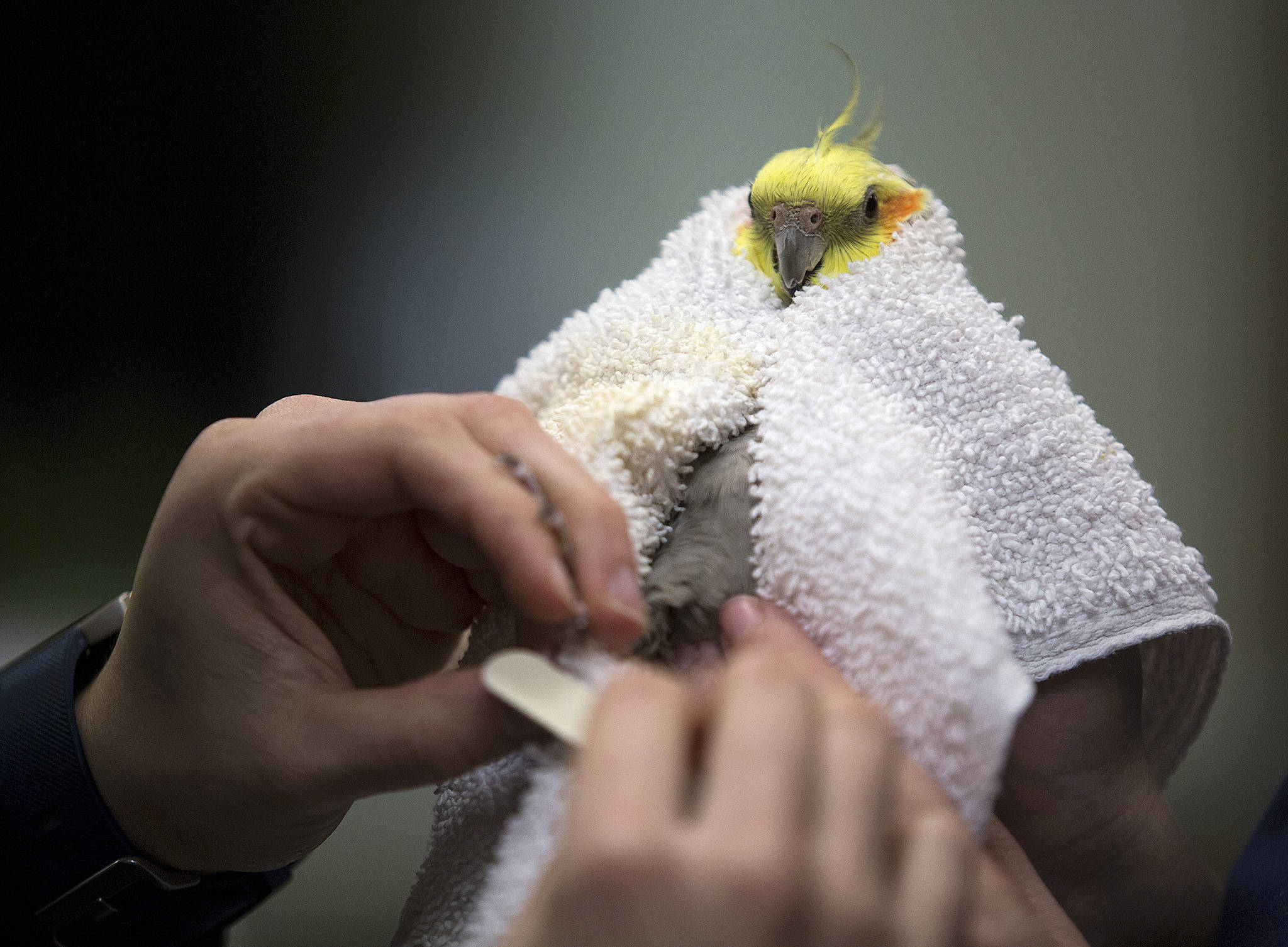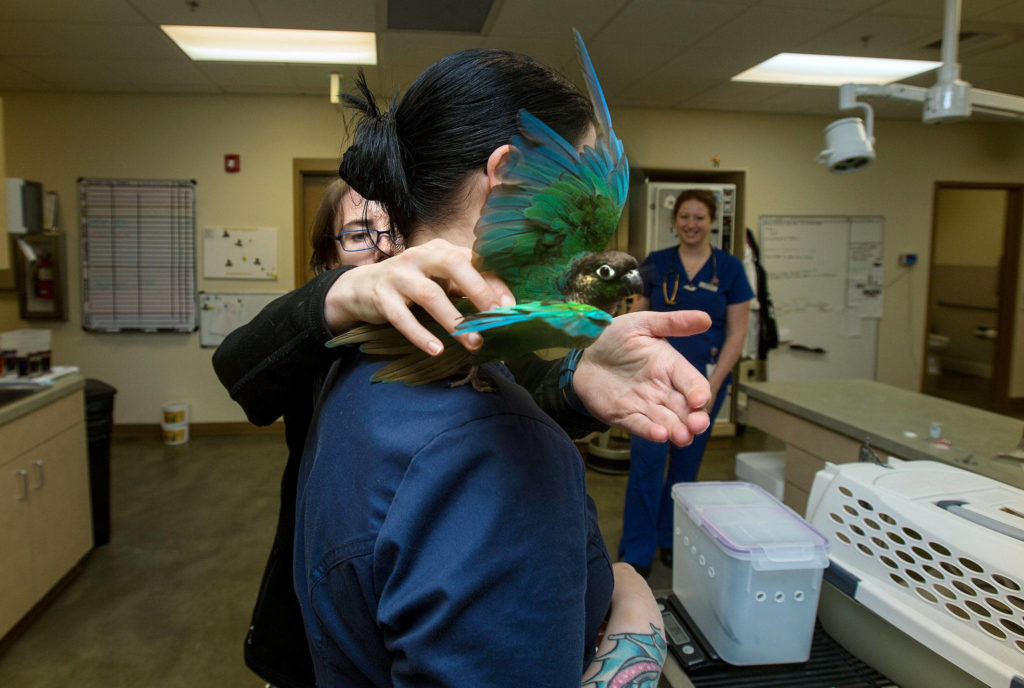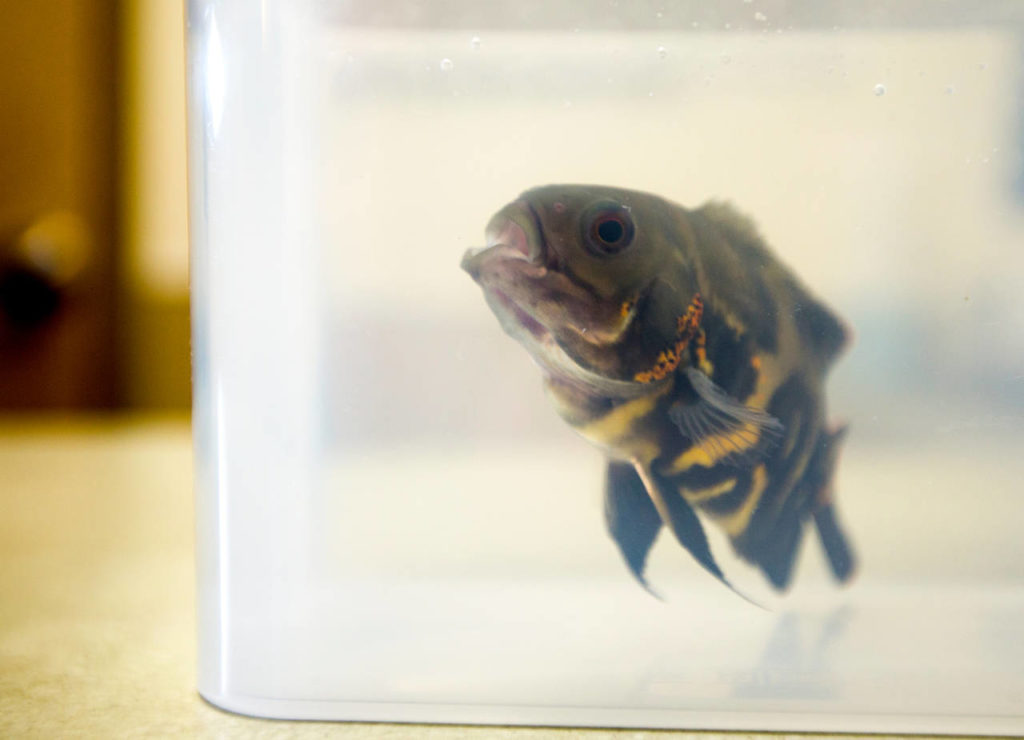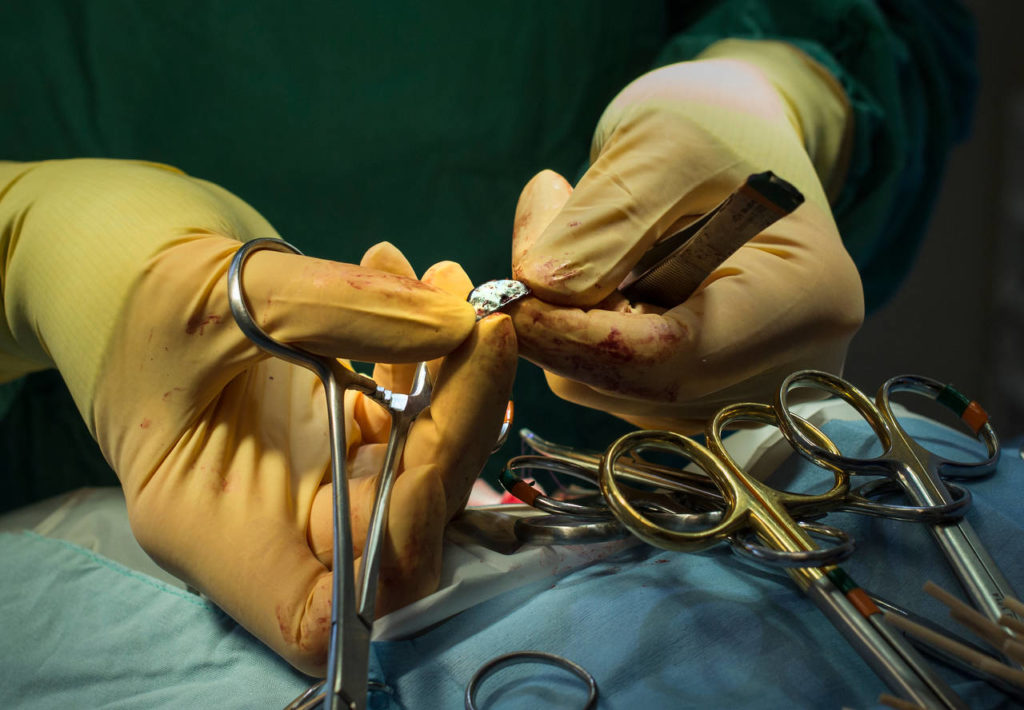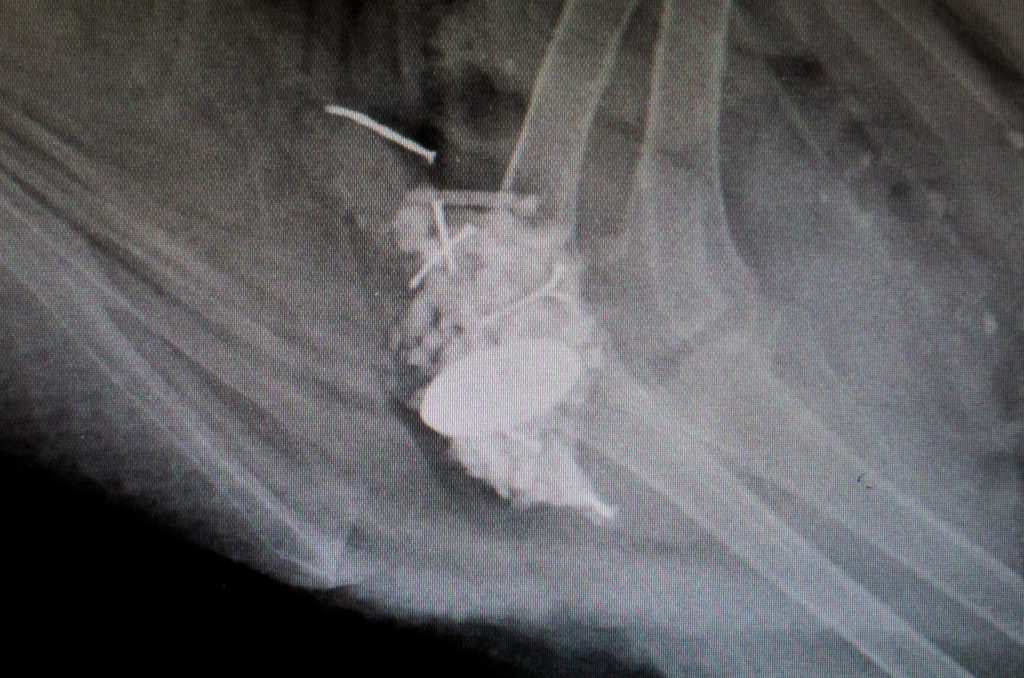Some strange and wonderful creatures come for treatment to the Center for Bird and Exotic Animal Medicine in Bothell.
Patients have included parrots and raptors, iguanas, ferrets and hedgehogs, goats and rabbits, chickens and llamas, wildcats, wallabies and kangaroos. And at least once, even a venomous rattlesnake, said medical director Anneliese Strunk.
“The cool thing about exotics and why I got into it is, you never know what’s going to walk in the door,” she said.
On a recent day, there was Curly, a hand-sized tiger oscar, a South American tropical fish that can live for 10 to 15 years and grow to the size of a dinner plate.
One of a carnivorous threesome named after the Three Stooges bumbling comedy act — Larry and Moe being at home cruising a large aquarium together — poor Curly is now nicknamed Strokey, after the medical event that prompted his visit to the center and left him with a drooping lower lip.
Owner Keri Overgard, of Mukilteo, said it happened after she transferred Larry, Moe and Curly to a larger tank in which the water may have been too cold. The transfer didn’t seem to faze Larry and Moe, she said, but Curly stopped eating and growing and the other two began bullying him.
Following instructions to move Curly to his own tank and to provide daily antibiotic baths, Overgard said she saw her fish start eating again, to the point of more than doubling in size.
Now that she’s discovered the Bothell hospital, she has no qualms about trusting its veterinarians with the parrots she’s owned for years, Overgard said.
“They did such a good job with Strokey that I’ll definitely bring Harold and Maude here,” she said.
An emergency hospital as well as a clinic and boarding facility for exotic pets, the Center for Bird and Exotic Animal Medicine is the only all-exotic hospital in the Pacific Northwest that does its own on-call emergency, according to Strunk. That means anytime a pet owner has an emergency, including nights and holidays, one of the veterinarians will meet them at the hospital, she said.
The hospital has been owned since 2012 by National Veterinary Associates, hospital manager Robert Stewart said. Prior to that it was owned by veterinarian Dr. Adolf Maas, who left in 2014.
According to its website, National Veterinary Associates “is the largest private owner of freestanding veterinary hospitals in the United States” and owns 424 veterinary hospitals/boarding facilities here and in Canada.
The Bothell hospital includes a compounding pharmacy, where technicians mix medicines for ailing pets, and two operating-room suites, where surgeries are scheduled three days a week.
If needed, specialists such as a cardiologist or oncologist can be called in, but the center’s veterinarians do a variety of procedures on their own, such as blood tests and X-rays, echocardiograms and endoscopies, the latter of which involves using a camera to look inside a creature’s body. It’s different than in humans, Strunk said.
“Birds are filled with air,” she said. “They have organs that are surrounded by air and we can put a camera into the air sac surrounding their organs and look at all the organs and take biopsies.”
The hospital has 24 employees, including three veterinarians: Dr. Strunk, Dr. Alicia McLaughlin and Dr. Meera Music. (The clinic also has two veterinarian interns who spend more than a year at the center.) Strunk said she did advanced training through an internship and a residency to get a certification in bird medicine 17 years ago.
All three veterinarians are qualified to treat a wide variety of exotic pets, Strunk said.
“Dr. Music is really focused on reptiles and Dr. McLaughlin is going to focus on birds,” she said, “but we all love everything. And I can’t stress that enough.”
Even, it seems, venomous snakes.
“We’ve actually removed a kidney from a rattlesnake,” Strunk said. “It had a tumor in its kidney.”
Unlike most of the snakes they’ve treated, such as those at The Reptile Zoo in Monroe, the rattlesnake had not been de-venomized, she said. Such cases call for sedation and the use of special tools, including a tube to keep the head isolated, she said.
One species Strunk said she loves seeing is any kind of raptor.
“We’ll see falconry birds,” she said. “And they are majestic and beautiful and they have their own special set of challenges to work with, because they are not very comfortable with handling.”
More commonly seen birds are cockatoos and parrots, like the African gray parrot Strunk brought in recently for a visit. She adopted Bravo 13 years ago, she said, when he got lead poisoning after eating some costume jewelry and his legs became paralyzed.
“So he pulls himself around by his beak and he’s my little bird ambassador,” she said.
Though it’s often said parrots can live for 50 years, Strunk said that’s more of an upper limit and many have shorter lifespans. One exception is an Amazon parrot named Marty, a frequent boarder who’s reached the ripe old age of 64.
Once owned by an opera singer, Marty can trill notes with the best of them, but won’t do it for just anyone. While at the Bothell center, he saves his best tunes for Jennifer Unick, his favorite veterinary technician. Strutting across her desk, he sings scales to her prompts; for most everyone else, it’s a whistle.
The Bothell center is also a teaching hospital, with a two-bedroom apartment upstairs for veterinary “externs,” students dropping in for a few days or a week to soak up some “practical exotic knowledge,” Strunk said. Interns, on the other hand, stay for up to a year and generally rent their own apartments, she said.
If it seems like there are a lot of woman veterinarians these days, that’s because there are. Even when Strunk graduated in 2000, she said, men made up only 30 percent of her class. Male enrollment in U.S. veterinary medical colleges fell below 20 percent for the first time in 2016-17 and it’s been more than 30 years since the ratio was 50-50, according to the latest annual data report by the Association of American Veterinary Colleges. Among certified veterinary technicians, which Strunk likened to nurses, 90 percent are women, the report states.
No one seems to know for certain why the number of male veterinarians is declining, but people point to the growth of companion animals over food animals and others speculate that more men might choose human medicine, dentistry and engineering fields, which pay better than veterinary medicine, according to an article in the Journal of the American Veterinary Medical Association.
Small wonder, then, that the Center for Bird and Exotic Animal Medicine is staffed predominantly by women.
Education at the Bothell center is not just for students, but for pet owners as well. A new trend called Fear Free, aimed at reducing the stress of veterinary visits on pets, depends on owners training their pets to become familiar with travel carriers, to willingly step on a scale, allow strangers to handle them and take medicine from a syringe.
“Training is really the new frontier,” Strunk said.
A treat caddy kept on hand to help with that includes mealworms for chickens, Cheerios for rabbits, guinea pigs and chinchillas and dried fruits for rats and parrots.
There are also nutritionally balanced pellets, fruit-colored and flavored to entice the birds to eat them, after which the idea is to switch to natural pellets without the added coloring.
Tango, a large blue-throated macaw owned by Dr. McLaughlin and participating in Fear Free training, prefers the green pellets, Strunk said. Visiting the center to get more accustomed to people, Tango basks in an ultraviolet light.
“Just like in reptiles, birds benefit from having the UVB radiation shining on them,” Strunk said. “It helps them use the calcium in their food better.”
A more recent discovery in bird medicine is that exercise is needed to minimize changes in bone density as birds get older, she said, because decreased bone density occurs in birds as well as in people.
“Doing wing trims used to be a really standard thing to do,” she said. “And we are trying to encourage owners to let the birds learn how to fly, and fly safely.”
Exotic pet owners are also encouraged to purchase a Client Loyalty And Wellness plan, known as a CLAW plan.
The plan enables them to pay a fixed amount each month for services ranging from essential to comprehensive. Prices vary depending on the plan and the pet, but can be as low as $30 a month and save owners as much as 40 percent off the cost of care.
The cost of care is a sore point in the business, Strunk said.
“I think you will find that there’s a whole lot of controversy in general in veterinary medicine about the cost of veterinary care,” she said.
Indeed, though the majority of online reviews of the Bothell hospital note the caring, compassion and competence of its staff, cost stands out as the main criticism. For some pet owners, some of whom may feel guilty for being unable to spend hundreds of dollars on a beloved pet, the cost can lead to some rather nasty comments.
Strunk said, “There are some people who are very vicious to us and feel that we should be helping their pets, if we cared about animals we would help them no charge.”
It’s a difficult situation for the veterinarian as well as the pet owner, she said, and no doubt has contributed to the rise in veterinarian suicides. According to a recent study, veterinarians kill themselves at a rate four times higher than the general population and one in six have considered suicide.
“There’s a lot of guilt associated with wanting to help animals, but also wanting to earn what you deserve,” Strunk said.
Still, it’s the interaction between pets and their owners that drew her to pet exotics, Strunk said. From high school through much of her college years, she’d focused on zoo animals. That changed during one summer.
“I had a summer abroad in Australia where I ended up working with a lot of bird vets,” she said, “and I saw the benefit of working in private practice with pets. I really like the bond between pets and their owners.”
How the pets are taken care of “plays a huge role in their health,” Strunk said. That’s why veterinarians at the Bothell center constantly update “care sheets” to give to pet owners.
“We try to be a good resource for clients to take care of their pets,” she said, “and we’re really focusing on wellness and prevention and that sort of thing.”
Talk to us
> Give us your news tips.
> Send us a letter to the editor.
> More Herald contact information.
